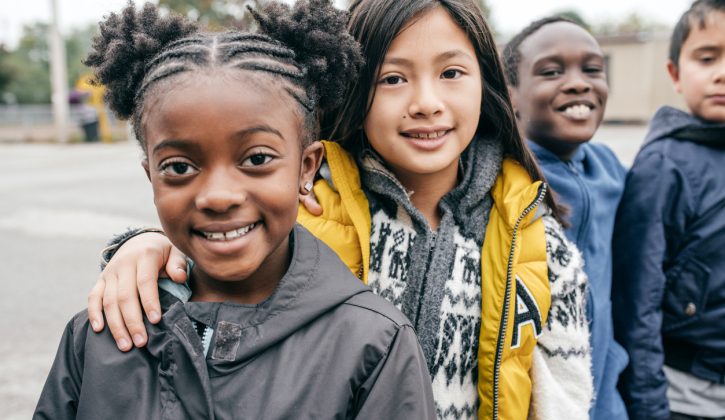As parents, we all want our children to find and enjoy positive relationships with their peers and people around them. But maybe you think you’re not supposed to meddle? Is it a good idea to help your child make friends?
First of all, everyone needs reliable relationships. But there are also many developmental benefits to childhood friendships, such as:
- Interacting with friends helps children learn and develop their social and emotional skills (increasing their emotional IQ)
- Building a strong support group can help kids manage the ups and downs in their life
- Forming friendships improves communication skills, enhances a child’s understanding of empathy, and improves their self-esteem
- Having a buddy to share experiences with makes children happy, which as parents is all that we want for our little ones
When it comes to friendships, there are two things parents should keep in mind…
First, it’s not only ok, it’s important to help your child make friends. And second, it’s crucial to expose children to opportunities that will allow them to make a variety of different friends and be a part of multiple friend groups.
The more interactions and experiences kids have, the better. And exposing your children to many different friend groups helps you achieve this. Different friend groups could be categized by school friends, sports friends, dance friends, neighbourhood friends, faith friends, cousins, etc.
Being a part of these multiple friend groups encourages kids to have and practice different roles, depending on the group that they are in. For example, at school, your child may be the funny one amongst their friends. But at hockey, they may be quieter and more reserved. This helps your child see themselves in different roles and helps create resiliency and adaptability.
Encouraging your child to become a member of different groups also exposes your child to individuals who have diverse interests, skills and temperaments. This can teach your child how to relate to others.
While conflicts in childhood friendships are inevitable, there can be positives to them, such as kids learning how to resolve differences and express their opinions. But there’s no denying that it can also be sad and difficult for kids to experience. The good thing about multiple friend groups is that they help children develop their self-esteem and manage their feelings around difficult relationships. Because if a child is having a difficult time with one friend group, they can rely on their other groups to help them cope, manage their difficult feeling for this period, restore their confidence, and maintain overall happiness.
If we want to encourage our kids to become friends with multiple people and groups, we need to support them by ensuring that they have the opportunities and skills to make new friends. Although the temperament a child is born with can make it easier (or more difficult) for them to put themselves out there, parents need to teach their kids the skill of “networking” or meeting others, especially those people outside of their immediate network.
How to help your child make friends…
Teach your kids to be welcoming…
Encourage your children to make eye contact, greet people with a hello, and properly introduce themselves. The best way to teach this is to model it.
Teach your kids to get involved in a group…
Make a suggestion of how they can naturally insert themselves without asking for permission. For example, encourage your kid to suggest “Looks like the blue team is short a person, I’ll join them!” instead of “Can I play soccer with you?” Practice this with your child at the park when you’re around so it’s rehearsed and they become comfortable doing it on their own.
Give your child tangible tasks of how to strike up a conversation with a new potential friend…
At school drop-off, you can suggest your child ask a specific child what TV show they like to watch or what sport they like to play. By asking something specific, your child will get a response from the other child which can turn into a conversation. Follow up after school and ask your child what they found out – this helps keep the friend top of mind.
Learn some names of the children in your child’s class or sports team…
Ask questions about classmates and teammates at home. This helps create familiarity and confidence for your child which will translate into them feeling comfortable talking with these specific kids when they are together.
Helping your child make friends helps you, too…
Even grown ups need to hone their friendship-making skills. Dealing with new people in the workplace and even fellow moms in the schoolyard means you may come across new and unfamiliar issues and conflicts. And sadly, mean girls are real, not just a classic movie.
Tagged under: Parenting,friendships,children and friends,child devleopment,how to help your child make friends,how can I help my child make friends
Category: family-life






